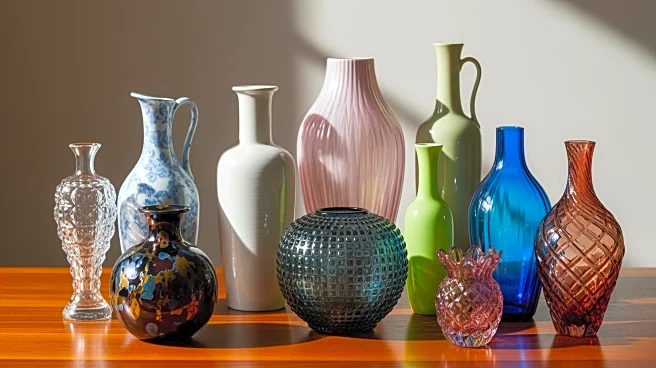What's Happening?
The Trump administration has imposed tariffs on various imports, including wood and derivative products such as upholstered furniture and kitchen cabinets, with rates ranging from 10% to 25%. These tariffs are intended to support domestic industries but
have significantly impacted the international trade of antiques and decorative arts. Dealers in the U.S. are facing challenges as the tariffs increase costs on imported items, making them less competitive compared to European counterparts. The tariffs have led to confusion and unpredictability in shipping costs, as rates can vary widely depending on the country of origin and the specific items being imported.
Why It's Important?
The tariffs imposed by the Trump administration are affecting the U.S. antiques and decorative arts market, pushing sales out of the country and disrupting the industry. Dealers are struggling with increased costs, which could lead to a decline in the availability of foreign antiques and decorative arts in the U.S. market. This situation may also affect cultural exchange and the circulation of art and antiques, which are important for fostering cultural understanding. The tariffs could lead to a shift in buying patterns, with more focus on domestic products, potentially altering the landscape of the U.S. decorative arts market.
What's Next?
The U.S. Supreme Court is scheduled to hear a case challenging the legality of the tariffs imposed by the Trump administration. The outcome of this case could have significant implications for the future of trade in antiques and decorative arts. If the court rules against the tariffs, it could lead to their removal, easing the burden on U.S. dealers and potentially revitalizing the market. However, if the tariffs are upheld, dealers may need to adapt by focusing more on domestic sourcing and sales.
Beyond the Headlines
The tariffs highlight broader issues of trade policy and its impact on cultural industries. The disruption caused by these tariffs raises questions about the balance between protecting domestic industries and maintaining international cultural exchange. The situation underscores the need for careful consideration of trade policies and their unintended consequences on various sectors.





![Daily Slop: 12 Feb 26 – New Commanders OC David Blough: “How do we get Terry [McLaurin] 10 targets a game?“](https://glance-mob.glance-cdn.com/public/cardpress/binge-magazine-card-generation/spaces/US/en/sb-nation/images/ppid_2cf3d240-image-177091266842313096.webp)










